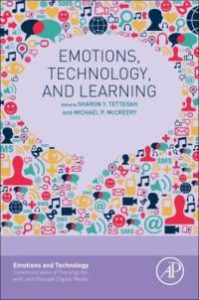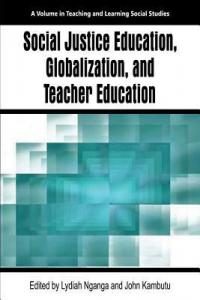Editors Sharon Y. Tettegah and Michael P. McCreery  focus their research collection, Emotions, Technology and Learning, on the often overlooked importance of affect in emerging technologically mediated educational environments. Research in the collection ranges from discussions of MOOCS, video learning, online social engagement, online non-verbal emotional cues – 🙂 – and the role of empathy. An important read not only for anyone looking to include more technology in their classroom approach, but also for a wider audience interested in how technology affects how we feel and learn.
focus their research collection, Emotions, Technology and Learning, on the often overlooked importance of affect in emerging technologically mediated educational environments. Research in the collection ranges from discussions of MOOCS, video learning, online social engagement, online non-verbal emotional cues – 🙂 – and the role of empathy. An important read not only for anyone looking to include more technology in their classroom approach, but also for a wider audience interested in how technology affects how we feel and learn.
Bringing together a diverse group of scholars and self-described storytellers, Rereading Appalachia: Literacy, Place, and Cultural Resistance is the first to gather scholarship on the once overlooked but now burgeoning field of Appalachia and literacy studies. Challenging the traditional and oft en biased social construction of “Appalachian,” while also recognizing the realities—social, political, and ethnic— which bind the people of this region, editors Sara Webb-Sunderhaus and Kim Donehower seek to investigate the varied literacy practices of Appalachian culture by framing these practices as a “literacy of resistance.” Starting with a challenge to previous scholarship and received notions on Appalachia literacy, the collection continues with a number of case studies, historical and current, of resistance through literacy. These include the experience of a gay mountain preacher’s relationship to literacy and identity, the impact of extract industries on social literacy, and the experience of Appalachian students at the turn of the century. Finally, the collection concludes with a call for increased Appalachian advocacy and resistance. Offering innovative research on an important but neglected issue, literacy and cultural scholars alike will find this volume essential for the study of rural regions and their diaspora.
en biased social construction of “Appalachian,” while also recognizing the realities—social, political, and ethnic— which bind the people of this region, editors Sara Webb-Sunderhaus and Kim Donehower seek to investigate the varied literacy practices of Appalachian culture by framing these practices as a “literacy of resistance.” Starting with a challenge to previous scholarship and received notions on Appalachia literacy, the collection continues with a number of case studies, historical and current, of resistance through literacy. These include the experience of a gay mountain preacher’s relationship to literacy and identity, the impact of extract industries on social literacy, and the experience of Appalachian students at the turn of the century. Finally, the collection concludes with a call for increased Appalachian advocacy and resistance. Offering innovative research on an important but neglected issue, literacy and cultural scholars alike will find this volume essential for the study of rural regions and their diaspora.
In The Hostile Environment: Students Who Bully in School, Susan Carter wades into the hotly debated topic of school bu llying. Carter aims to explore the current research environment on bullying, and suggest that different perspectives are needed to see a greater impact for students and schools. In a discussion that includes topics such as the persistence of bullying, legal aspects, risk factors, the new cyber context, and mental health, Carter draws out the implications and opportunities of an anti-bullying approach that links pediatric mental health providers, parents, and educators. Carter argues that through more open communication lines and by integrating remediation and intervention, anti-bullying efforts may have more productive results.
llying. Carter aims to explore the current research environment on bullying, and suggest that different perspectives are needed to see a greater impact for students and schools. In a discussion that includes topics such as the persistence of bullying, legal aspects, risk factors, the new cyber context, and mental health, Carter draws out the implications and opportunities of an anti-bullying approach that links pediatric mental health providers, parents, and educators. Carter argues that through more open communication lines and by integrating remediation and intervention, anti-bullying efforts may have more productive results.
The collecti on Social Justice Education, Globalization and Teacher Education brings together a selection of techniques and ideas for including social justice and global perspectives in the training of new teachers. After a discussion of the concept of “Globalization” and how it impacts education, the collection includes case studies of instructional strategies for using literature, data and mapping, and technology to promote social justice in education. Chapters also cover issues such as commonly encountered struggles in social justice teacher education, as well as skills such as problem solving, inclusion and critical thinking. Overall, this volume provides a general overview for researchers and students of education who wish to make social justice a central focus of their work.
on Social Justice Education, Globalization and Teacher Education brings together a selection of techniques and ideas for including social justice and global perspectives in the training of new teachers. After a discussion of the concept of “Globalization” and how it impacts education, the collection includes case studies of instructional strategies for using literature, data and mapping, and technology to promote social justice in education. Chapters also cover issues such as commonly encountered struggles in social justice teacher education, as well as skills such as problem solving, inclusion and critical thinking. Overall, this volume provides a general overview for researchers and students of education who wish to make social justice a central focus of their work.
The ability of tests and measures to accurately show academic and educational achievement has been a long standing debate. Yong Zhao’s edited volume, Counting what counts: reframing education outcomes, brings together a collection of articles that challenge the authority of standardized tests and reframe the question of educational outcomes for the 21st century. Authors in this volume look at the importance of education in the development of traits and skills necessary for a productive future, including personality, motivation, creativity, diversity, and sociability. By arguing that current measures overlook these important factors as well as posing alternatives, Counting what counts is an opportunity for policy-makers, educators, and administrators to rethink educational requirements and evaluation.
long standing debate. Yong Zhao’s edited volume, Counting what counts: reframing education outcomes, brings together a collection of articles that challenge the authority of standardized tests and reframe the question of educational outcomes for the 21st century. Authors in this volume look at the importance of education in the development of traits and skills necessary for a productive future, including personality, motivation, creativity, diversity, and sociability. By arguing that current measures overlook these important factors as well as posing alternatives, Counting what counts is an opportunity for policy-makers, educators, and administrators to rethink educational requirements and evaluation.
